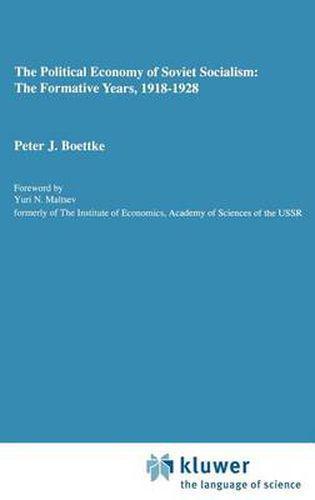Readings Newsletter
Become a Readings Member to make your shopping experience even easier.
Sign in or sign up for free!
You’re not far away from qualifying for FREE standard shipping within Australia
You’ve qualified for FREE standard shipping within Australia
The cart is loading…






This title is printed to order. This book may have been self-published. If so, we cannot guarantee the quality of the content. In the main most books will have gone through the editing process however some may not. We therefore suggest that you be aware of this before ordering this book. If in doubt check either the author or publisher’s details as we are unable to accept any returns unless they are faulty. Please contact us if you have any questions.
This book presents a narrative of one of the more interesting utopian experiments in comparative political and economic history: the first decade of the Soviet experience with socialism (1918-1928). Though historical and textual analysis, the book’s goal is to render this experience intelligible, to get at the meaning of the Soviet experience with socialism for comparative political economy today. The book examines the texts of Lenin, Bukharin, and other revolutionaries, as well as the interpretations of contemporary historians of the revolution and the writings of more recent interpreters of Soviet political and economic history.
Arguing that the first three years of the Bolshevik regime (1918-1921) constitute an attempt to carry out the Marxian ideal of comprehensive central planning, and that the disastrous results, which all commentators agree occurred, were the inevitable outcome of this Marxian ideal coming into conflict with the economic reality of the coordination problem that all economic systems face, the book draws clear conclusions and elucidates the air of mystery that often surrounds the subject. Offering a radical challenge to contemporary comparative political economy at the level of high theory, applied research, and public policy, this book is appropriate for students and scholars interested in Marxism, economic history, political economy, and Austrian economics.
$9.00 standard shipping within Australia
FREE standard shipping within Australia for orders over $100.00
Express & International shipping calculated at checkout
This title is printed to order. This book may have been self-published. If so, we cannot guarantee the quality of the content. In the main most books will have gone through the editing process however some may not. We therefore suggest that you be aware of this before ordering this book. If in doubt check either the author or publisher’s details as we are unable to accept any returns unless they are faulty. Please contact us if you have any questions.
This book presents a narrative of one of the more interesting utopian experiments in comparative political and economic history: the first decade of the Soviet experience with socialism (1918-1928). Though historical and textual analysis, the book’s goal is to render this experience intelligible, to get at the meaning of the Soviet experience with socialism for comparative political economy today. The book examines the texts of Lenin, Bukharin, and other revolutionaries, as well as the interpretations of contemporary historians of the revolution and the writings of more recent interpreters of Soviet political and economic history.
Arguing that the first three years of the Bolshevik regime (1918-1921) constitute an attempt to carry out the Marxian ideal of comprehensive central planning, and that the disastrous results, which all commentators agree occurred, were the inevitable outcome of this Marxian ideal coming into conflict with the economic reality of the coordination problem that all economic systems face, the book draws clear conclusions and elucidates the air of mystery that often surrounds the subject. Offering a radical challenge to contemporary comparative political economy at the level of high theory, applied research, and public policy, this book is appropriate for students and scholars interested in Marxism, economic history, political economy, and Austrian economics.